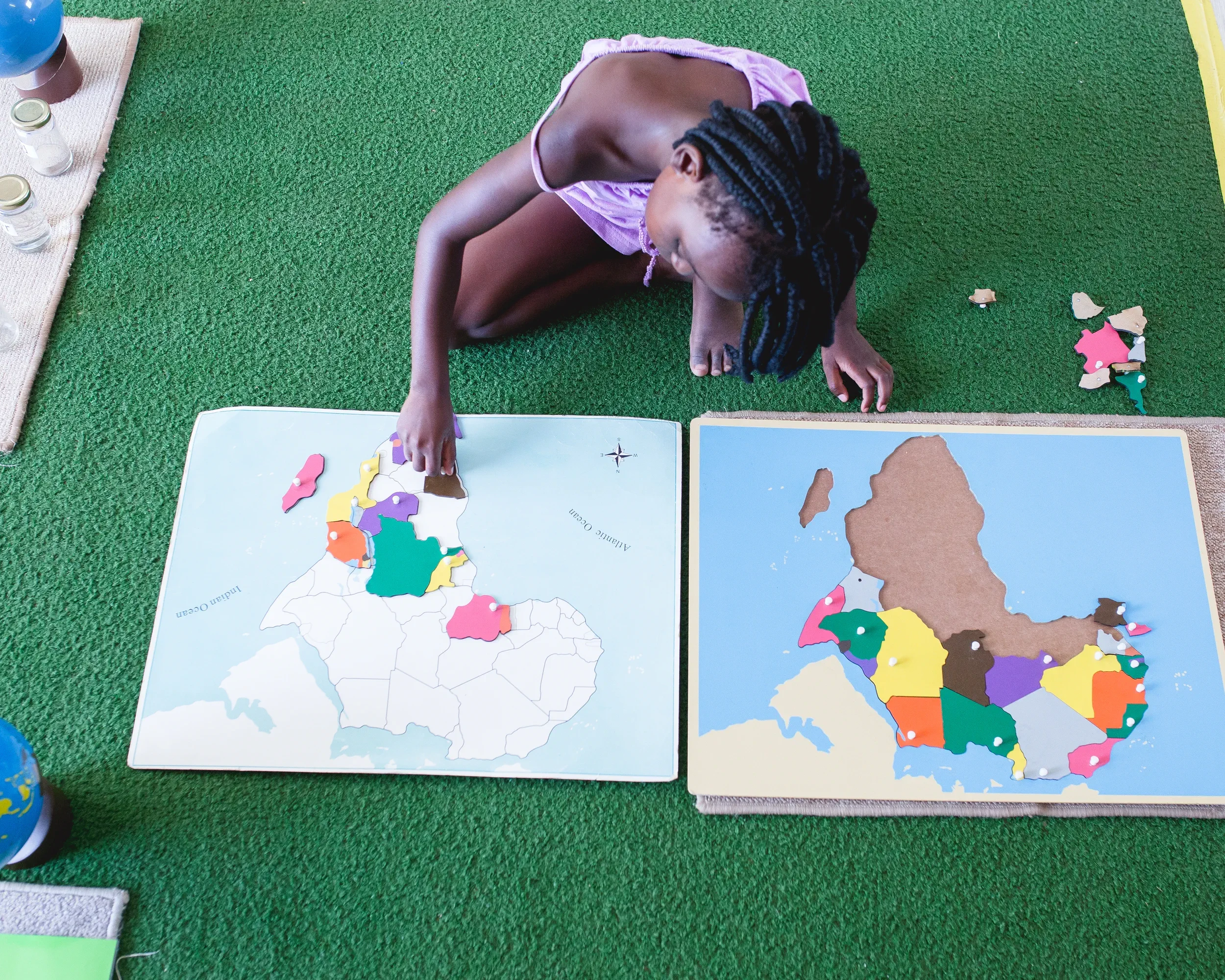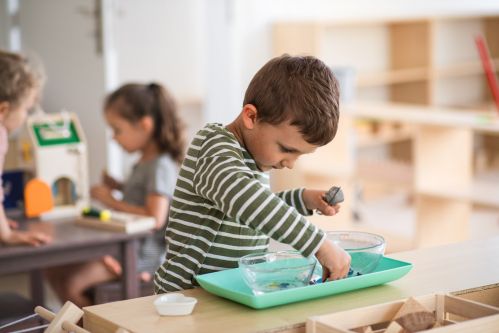

Montessori children develop a remarkable level of physical and intellectual independence, uncommon in most preschool settings. From day one, they learn to care for their own needs and to take responsibility for their environment, from tidying up after lunch to caring for classroom plants and animals. This daily trust in meaningful tasks fosters a genuine self-confidence born of real accomplishments, rather than shaky self-esteem based on empty praise.
In our Montessori environment, mistakes are embraced as essential to learning. A spill or a broken glass is met calmly and constructively, teaching children that mistakes are natural and valuable for growth. Through this supportive approach, our preschoolers develop a growth mindset—a resilient, optimistic outlook that is foundational for a joyful and successful life.
Montessori preschool children learn to write, read and understand mathematics while in preschool. They do so joyfully, with activities they choose, including drawing pictures, writing stories, or participating in small group exercises. The work Montessori 5-year-olds do is astounding.

Recent research indicates that executive function skills, including self-control, organisation, and time management, are more closely linked to success in school and life than IQ. Montessori preschool intentionally cultivates these essential skills. For example, when a child patiently waits for a material another child is using or observes a friend at work, they practice impulse control. Engaging in multi-step activities, including table washing, and completing a full cycle of work teaches organisation and problem-solving.
Grace and courtesy lessons, along with a daily focus on respecting the rights of peers and teachers, create a nurturing environment where social skills develop naturally. Through these practices, children build a solid foundation of executive function skills that support lifelong learning and success.
Most play-based programs segregate children by age into the 2’s, 3’s and 4’s, and so on. Montessori preschools instead group 3 to 5-year-olds into one class. A child stays with the same teacher for two years. This builds a strong, family-like community, with lasting relationships between child and teacher, and friendships between children of different ages. Young children look up to and learn from older ones; while the 5-year-olds gain confidence as they become classroom leaders and mentors for their younger peers.
Most preschools follow tight, adult-led schedules, with a new group activity every 15-30 minutes. In contrast, authentic Montessori preschools offer long, uninterrupted work periods that allow children to fully engage in tasks that they have chosen for themselves, under the careful, individual guidance of their teacher. Montessori children thus have repeated opportunities to get really engrossed in their activities, and experience regular states of concentrated focus. Visit a good Montessori preschool, and you may see a 3-year-old spending 30 minutes carefully arranging colour tablets in a rainbow pattern, or a 4-year-old tracing, colouring and labeling a map of the world. As adults, we can’t focus when we know we’ll be interrupted soon; neither can children. Unstructured, child-led time is key in building concentration skills at the foundation of all learning.
3
While most play-based preschools feature toys commonly found at home—like Lego, dress-up areas, colouring pages, trains, and blocks—Montessori preschools offer children something uniquely enriching. Carefully displayed on low shelves, you’ll find a wide range of scientifically designed learning materials: from the Pink Tower and Colour Tablets to pouring exercises, the Movable Alphabet, and advanced maths tools that introduce the decimal system and arithmetic into the thousands.
Each Montessori activity is chosen based on children’s preferences at hundreds of Montessori schools, where children repeatedly engage with these materials by choice. Every activity builds multiple skills, enabling children to solve problems, engage their hands and senses, and repeat tasks to achieve mastery. By moving through these activities at their own pace, Montessori preschoolers joyfully enhance their gross and fine motor skills, progressing naturally to reading, writing, and complex maths—all within the preschool years.
Full of energy, a three-year-old never stops exploring, bombarding her parents with “why’s” from the moment she wakes until her final night time breath. We recognise this natural tendency and use it motivate children to learn by guiding children to ask real meaningful questions about the world first. We then help them discover the answers.
 When the child really understands, he knows the sequence of facts that demonstrate the truth of a given idea – as against just citing a book under a teacher’s authority. We want children to understand the world so they can act in it; memorized chains of words or symbols are not knowledge, and undercut motivation.
When the child really understands, he knows the sequence of facts that demonstrate the truth of a given idea – as against just citing a book under a teacher’s authority. We want children to understand the world so they can act in it; memorized chains of words or symbols are not knowledge, and undercut motivation.
Example: Mathematics: In Montessori, children learn concrete, simple number concepts with specialised tangible equipment which provide a context for how number values relate to each other before introducing numbers in an abstract form (pen and paper).
At Nurture and Nature Montessori, the child’s choice to learn is central to our approach: real learning (as opposed to memorising, or engaging in “hands-on projects” without further meaning) has to be built on sincere interest of the child. To engage the child’s interest, we take his full context into account: his background knowledge, his skill level, his values and interests. This is done in 2 ways. Firstly we provide children with choice in terms of the work which they engage in during the Montessori work cycle. Secondly, we provide dedicated one- on-one teaching periods which gives children undisturbed time with their teacher in order to ensure all areas of the curriculum are covered and all questions are answered.
To keep knowledge meaningful and fun, we create real application opportunities in each subject. Throughout, we create applications that engage the children’s minds on the topic they are learning: they think about the content we want them to remember, and thus make the knowledge their own.
At Nurture and Nature Montessori we create an environment that facilitates a child’s choice to work. From the child-sized furniture, to the self-correcting materials; to his choice of mats or table and work partners; from the plants and animals in the classroom, to the type of teachers we hire: everything is tailored to help the child choose to learn and to concentrate on productive work and personal development.
Montessori is for all children. To the casual observer, Montessori students may appear advanced for their age, leading to the assumption that the schools cater to gifted children. In reality, Montessori schooling helps each child develop individuality in a way that accentuates his or her innate intelligence. Montessori gives the child the opportunity to gain mastery at a pace that allows each child to be successful. Montessori takes full advantage of the young child’s intense desire to learn while respecting his individuality. The teacher takes her cues from the child’s interests, and learning is organised to make the most of those interests.

To the untrained eye, a Montessori classroom might seem chaotic, but a closer look reveals a purposeful and organised environment where children thrive with independence. At its core, the Montessori system empowers children to take charge of their own learning. Self-discipline is nurtured from a young age, with minimal adult interference. Rather than acting as traditional teachers, Montessori educators serve as guides, enabling children to learn independently using thoughtfully designed materials.
In a Montessori classroom, children aren’t directed to move in groups or participate in the same activity simultaneously. Instead, a variety of self-correcting (auto-didactic) materials are available, allowing children to choose what interests them. After an initial demonstration by an experienced adult or an older child, each child is free to explore the material independently. This approach fosters concentration, coordination, and independence, creating an orderly world where authority is rarely needed.
Montessori philosophy holds that children naturally gravitate toward a state of calm, focus, and active engagement. Disputes in the classroom are typically resolved by the children themselves, who learn conflict resolution by observing respectful interactions from their teachers. The adult’s role is to observe and facilitate self-discipline rather than to direct activities or enforce rules, cultivating an environment where children develop self-reliance and respect for themselves, others, and their surroundings.
On the contrary, in the Montessori classroom, children are allowed to move freely about to access all the learning materials they need. Additionally, for children, play and “work” are often the same thing. In other words, when children engage with the Montessori learning materials, they are indeed learning but it feels like play to them. For example, think of how your own child can joyfully while away the hours manipulating and arranging objects like toys or blocks. The two experiences are similar, but in the Montessori environment, the student is actually working toward mastery of skills and subjects. Montessori students are allowed to work with specific learning materials for as long as they desire, and the fact that they will until they feel they have mastered it is testimony to the power of the method. Children in Montessori choose to work toward mastery and are internally motivated by a natural love of learning.
An education based on the observation of children, and on your child in particular, is hard to outdate. Everyone knows the approximate ages children begin to walk, to talk, to lose teeth, even to learn to read. Fads in education come and go because they are not based on observation of children. Often they’re not even based on child development. The Montessori Method, on the other hand, represents a solid body of observation of child development that has been successfully employed internationally for over a hundred years. Montessori methodology is closer to a true scientific method of instruction than any other educational program in the world today.
The respect the teacher shows each child is a model for children to follow in learning to respect each other. Young children interact with each other and with the adults, gradually becoming more giving and more sensitive to others. The two to three year age span within each class causes the learning of younger children from older ones to be a natural occurrence. Montessori respects the child and the child’s need, from time to time, for privacy. Areas and activities in the classroom provide for solitude, as well as, interaction with peers. Older children often tutor and assist the younger children and children may work together or by themselves as they choose.
 At its core, the Montessori philosophy is based on respect. Respect for the planet, for ourselves and for each other. What Montessori teachers are actually being with the children is: respectful. To some, this might at first appear as emotional distance or hard-heartedness. It’s not! Respect for the child runs deep and means, among other things, that we don’t invade their personal space without being invited. They try not to define children by their appearance, so we don’t make a habit of remarking on their outfits: as a matter of fact, they feel that it’s more important that the child dress him or herself than that their socks match! As teachers, the love for your children runs very, very deep indeed. You’ll find, as the children do, that it is a firm, fair, steady type of affection without hysteria and not conditioned upon “good” behaviour. We strive to avoid patronizing the child; our voices when speaking with them are our normal voices, not high-pitched or saccharine sweet. We cherish children, and when your child needs that extra helping of compassion, hugs and kisses, the child will find it.
At its core, the Montessori philosophy is based on respect. Respect for the planet, for ourselves and for each other. What Montessori teachers are actually being with the children is: respectful. To some, this might at first appear as emotional distance or hard-heartedness. It’s not! Respect for the child runs deep and means, among other things, that we don’t invade their personal space without being invited. They try not to define children by their appearance, so we don’t make a habit of remarking on their outfits: as a matter of fact, they feel that it’s more important that the child dress him or herself than that their socks match! As teachers, the love for your children runs very, very deep indeed. You’ll find, as the children do, that it is a firm, fair, steady type of affection without hysteria and not conditioned upon “good” behaviour. We strive to avoid patronizing the child; our voices when speaking with them are our normal voices, not high-pitched or saccharine sweet. We cherish children, and when your child needs that extra helping of compassion, hugs and kisses, the child will find it.
Nurture and Nature Montessori | Copyright 2025 | Privacy Policy Powered by Hostify